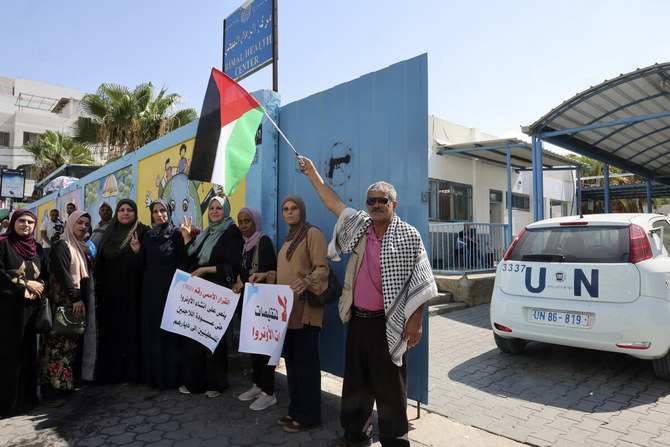New York City: The funding crisis for Palestinian refugees in Jordan and other host countries has created an “absolutely unbearable” situation that could soon reach an inflection point, the chief of the UNRWA has warned.
The UN Relief and Works Agency for Palestine Refugees in the Near East supports more than 5 million Palestinian refugees across the Middle East, but has been met with a series of financial crises due to donor countries slashing funding.
The agency is set to mark 75 years since its establishment next year, but its commissioner-general, Philippe Lazzarini, has warned that immediate funding is required to safeguard millions of Palestinian refugees.
Lazzarini appeared at a press briefing Thursday on the sidelines of the UN General Assembly alongside Ayman Safadi, Jordan’s deputy prime minister and minister for foreign affairs and expatriates.
The two had earlier taken part in a high-level meeting organized by Jordan and Sweden to encourage increased funding for the UNRWA.
Lazzarini said that the agency required between $170 and $190 million just to keep its activities in Jordan, Lebanon, Gaza and elsewhere running until the end of the year.
He added: “We had some pledges today which will definitely help us to provide more clarity and run the operation in the foreseeable future, but we haven’t yet met our objective.
Jordan’s foreign minister spoke at length about his country’s issues hosting large numbers of Palestinian refugees amid the UNRWA funding crisis, saying that the agency is “the only beacon of hope in a very bleak situation full of deprivation.”
He added: “The challenges are huge. The difficulties facing UNRWA are complicated and increasing in scope. Therefore, we call on the international community to act to provide the support UNRWA needs.
“If we are still unable to establish justice for the Palestine refugees, let us at least give them a chance to live decently.”
Despite several UN member states pledging Thursday to boost their contributions to the UNRWA, the agency still only has the means to provide services through to October.
Lazzarini told the media: “I told the member state mission: ‘I know that it sounds like a broken record when we talk about the financial crisis of the agency.’ But I also told them: ‘Please don’t take our ability to muddle through this crisis as a given.’
“There will be a point where we reach an inflection point. It has become absolutely unbearable to deal with a situation where the needs of the Palestinian refugees increase, the expectations increase.
“This tension cannot continue. It’s highly unsettling. It’s unsettling for the communities … for the host countries.
“And this is also fueling in the region a feeling of abandonment by the international community.”
The UNRWA chief warned that his agency’s funding crisis would hit children the hardest. Lazzarini recently oversaw the opening of a school for Palestinian refugee students, but said that he did not know if the site would exist by the end of the year.
The COVID-19 pandemic and austerity measures have also compounded the woes of refugee children, Lazzarini said.
“One indicator which I was sharing with a member state here today was that in the fourth grade this year, only 20 percent of the (Palestinian refugee) students reached the average for Arabic and mathematics, whereas in 2015, it was 60 percent.
“And this is quite significant, and collectively, we have to look at how can we bring back a quality education.”
Safadi was asked about the possibility of engagement between Egypt, Saudi Arabia, Israel, the EU and the US over the Palestine issue, and the potential for a solution to the plight of Palestinian refugees.
Saudi Crown Prince Mohammed bin Salman said recently that the Kingdom was taking steps to reach a political agreement with Israel.
Safadi said: “I will not comment on what the crown prince of Saudi Arabia has said in terms of efforts made towards reaching a political agreement between Saudi Arabia and Israel but we trust the position of our brothers in Saudi Arabia.
“They have a very firm position in terms of supporting the Palestinian question, the Palestinian right, and supporting the two-state solution as the only path towards achieving peace and stability in the region.”
The foreign minister reiterated Jordan’s position: “We insist on the two-state solution, that if undermined, and if hope is lost completely in reaching this solution, then there will be a one-state solution, and this is not a solution.
“It will be a heinous situation of racial discrimination that would lead to further conflict and further deterioration.”
Lazzarini said that his chief focus during the UN General Assembly has been to place the issue of Palestinian refugees “back on the political agenda.”
He added: “My main ask is that the issue of the safeguarding of the right of the Palestinian refugees be brought to the agenda, and by having this conversation we talk also after that, about the sustainability of an agency like UNRWA.”
Lazzarini also discussed the recent eruption of violence in Ain Al-Hilweh refugee camp in Lebanon, which he described as “very worrying.”
He added: “As we know, it has prevented our kids to go back to school. Our schools have been used by the militants. We have called more than once to the militants to vacate our schools.
“They need to be protected. They need to be respected. And sadly, this has not been the case.
“So, I think the fighting in Ain Al-Hilweh right now is adding a layer to the extraordinary human misery prevailing already in the camp.”
Safadi spoke on his country’s engagement with the political process, saying that Jordan is “talking with everybody” in a bid to reach a resolution.
He added: “We are engaged with all parties, including with the Israelis. We’re talking to everybody.
“We’re working with the Americans, with the Europeans, we’re in full coordination with the Palestinians, with other Arab countries, Egypt and others to try and find a political horizon.”






















